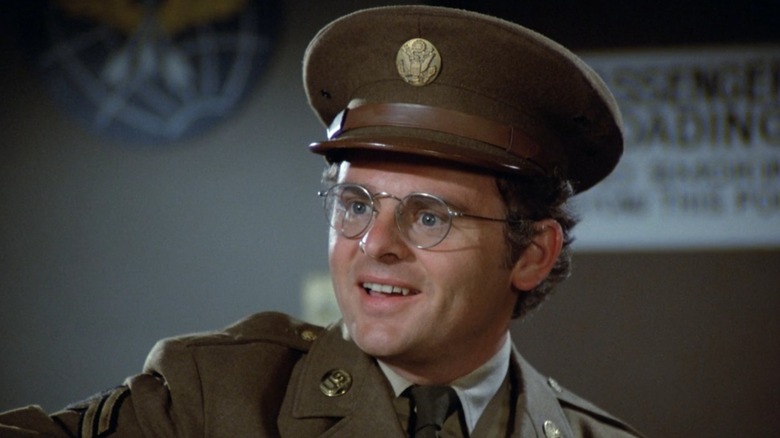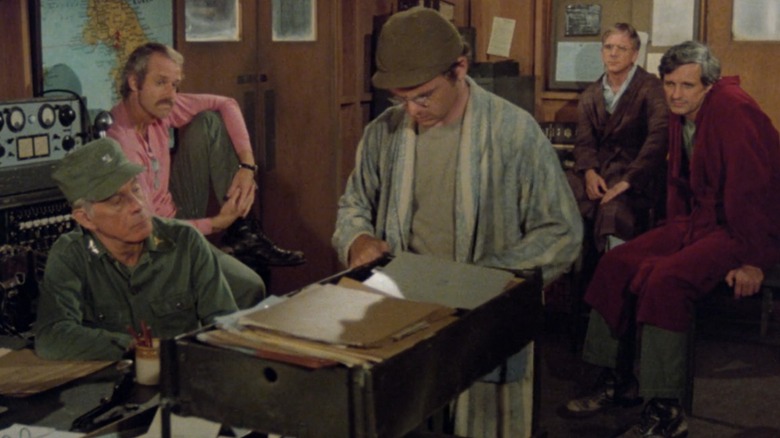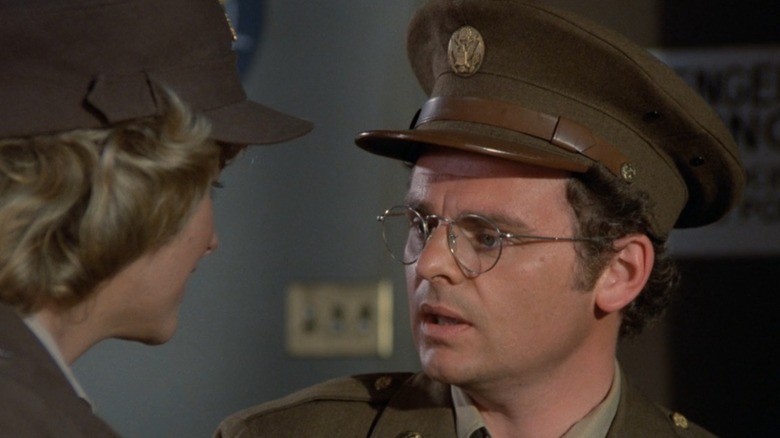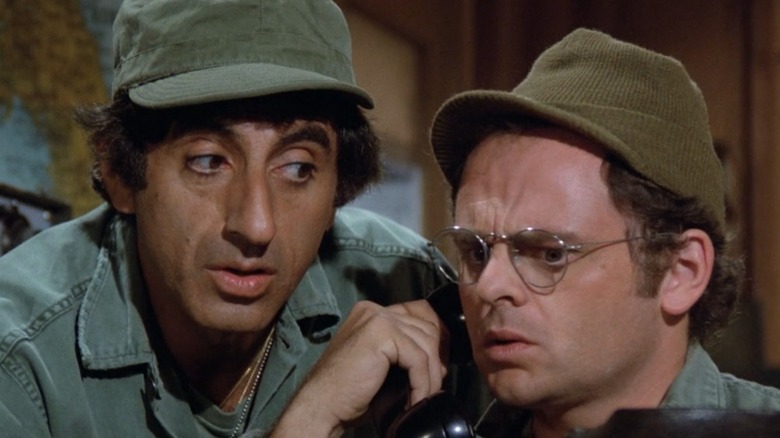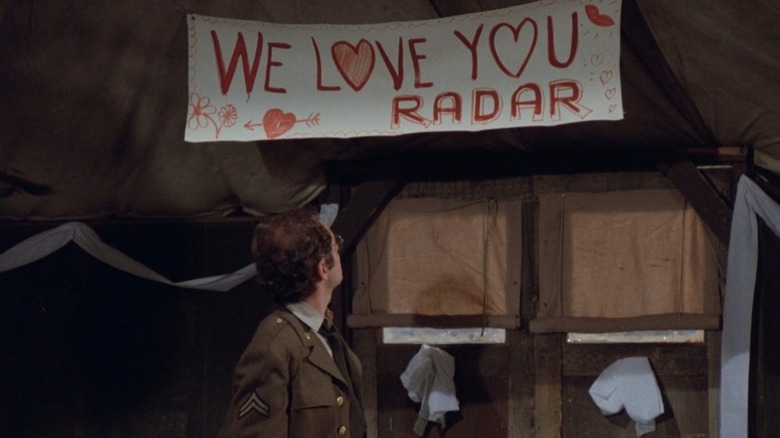Why Gary Burghoff Left M*A*S*H And Never Returned
Without Radar O'Reilly (Gary Burghoff), the 4077th MASH unit would fall to pieces. At least, that always seemed to be the case during the first 7 seasons of the show's 11-season run. So when news broke that Burghoff was leaving the show, it left viewers curious about how "M*A*S*H" might go on without him.
The long-running army hospital sitcom managed to recover and deliver several more great seasons, giving Burghoff an emotional sendoff with the episode "Good Bye, Radar," promoting crossdressing, Section 8-chasing Corporal Klinger (Jamie Farr) to the job of company clerk. The show famously finished strong with a feature-length finale that became the highest-rated TV telecast of all time, but Radar didn't return. Through the characters who did stick around, he left his beloved teddy bear for Hawkeye (Alan Alda), who put it in a time capsule in the show's penultimate episode.
Burghoff's brief appearances on the failed sitcom "AfterMASH" showed that Radar still lived on his family farm, but what happened to the actor himself? Why did he leave "M*A*S*H" in the first place? The answer, according to Burghoff himself, is simple: burnout.
The burnout is real
In a written contribution to Suzy Kalter's 1984 guide "The Complete Book of M*A*S*H," Burghoff devotes the majority of his allotted space to explaining why he had to move on from "M*A*S*H." The actor, who famously became devoted to Christianity after leaving the show, compared his exit to a biblical rule saying that after six years of service, "on the seventh year, that person shall go free." More specifically, though, Burghoff says that he was experiencing a major case of burnout during his later years on the show, though he didn't have a name for it at the time.
"The disillusionment [of working in a changing world] is so great that you work harder to achieve the things you think you are lacking," Burghoff wrote. "The harder you work, the less you accomplish, so more panic sets in and you spiral downward to burnout, a nearly total depletion of your vital energies." The actor even describes the physical and mental symptoms of burnout, and recommends a book about it — Dr. Herbert Freedenberger's "Burn-Out" — to anyone who's suffering.
Burghoff wanted to focus on family
The pressure of the role, it seems, changed Burghoff's life in a way he wasn't prepared for. "For seven years, no new person in my life called me Gary," the actor wrote in Kalter's book. "Only Radar." It also put a strain on his family life, as he got married just a year before the show began, became a father during its run, and ended up splitting up with his wife after leaving "M*A*S*H," according to a radio interview he gave Ontario's JOY 1250. Burghoff later remarried, and according to the interview, at one point, he moved to be close to his ex so they could still co-parent their children. "A divorce is between two people, never between a parent and children," Burghoff said at the time.
The actor's changing family life reportedly contributed to his decision to leave "M*A*S*H" as well. In an interview with the Television Academy Foundation, director Charles S. Dubin said, "He was having trouble with his wife at the time." The filmmaker recalled that when filming his goodbye episode, Burghoff broke down in tears during a scene in which he had to say goodbye to a nurse he met and fell for at the airport. Dubin recalled walking Burghoff around the FOX lot in order to help him process the emotions, and said that he thinks the actor had an emotional response because, "In the script, he was talking about a future with her, possibly, [which] related to his own domestic problems."
Were there difficulties on set?
Burghoff himself acknowledged the "strain" the show put on his home life in Kalter's book, writing, "After the first three years, I was in fewer shows because of the strain on my family life." He recalls the hesitant response he received from the network when he said he wouldn't be coming back, but explained, "Year seven, all I could really think about was being able to take a year off to be with my daughter."
Though Burghoff explained all of this in print just a year after "M*A*S*H" ended, rumors still persist that his exit had something to do with him being in some way difficult on set. "Gary Burghoff always made me feel sorry for him, because he felt, not neglected, but he felt he wasn't getting his proper dues," Dubin shared in the above interview, noting that he was a "sweet" man. In the same interview, executive producer Burt Metcalfe noted that Burghoff had insomnia and other sleep-related issues that made it tough for him to make his call times. Metcalfe was also complimentary of Burghoff, saying, "I'm only mentioning that other aspect of it because he wasn't as happy in the show as other people were, and he was really anxious to move on."
A 1983 biography of Alan Alda by Raymond Strait presented Burghoff's time on set in more colorful detail, describing a yelling match between Burghoff and Henry Blake actor McLean Stevenson, plus an unpleasant encounter with Trapper John actor Wayne Rogers. "Burghoff doesn't particularly like to take direction," Strait wrote. "He knows his role and plays it the way he sees it. This so irritated Wayne Rogers that he threw a chair at Burghoff during a scene." According to Strait, Alda smoothed things over in future script discussions by joking that crew members should "Bring Mr. Rogers' chair, please."
Goodbye, Radar
For his part, Burghoff once wrote that any bad moods he may have had were in service to the show. "Stories have been written about my irritability on the set, which I think were unfair," he wrote in "The Complete Book of M*A*S*H." He continued, "They never focused on others' irritability. We all cared a great deal about 'M*A*S*H' and each other." As Burghoff puts it, during his final two seasons on the show he "reacted animatedly — not viciously, not without love and respect."
In retrospect, it sounds like a variety of personal factors played into Burghoff's choice to leave the show, and he felt it was the best and only decision for him. By all accounts, the actor is a fascinating, complicated person, and his portrayal of Walter "Radar" O'Reilly is an inarguable high point of the series. Radar may have left the 4077th, but he'll always be at the heart of a legion of fans' fond memories of "M*A*S*H."
